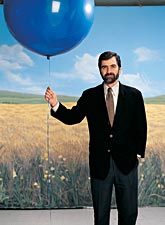Joseph Bast seems to be one of the last people in America to doubt the danger of global warming.
|
Photograph: Lisa Predko
Backdrop: Tamara Backdrops  |
|
Joseph Bast of the Chicago-based Heartland Institute |
The recent Al Gore documentary An Inconvenient Truth is just the latest volley in a summer of high-profile opinions about global warming. Most climate experts agree that the earth is heating up-and they attribute the phenomenon to humans. Even the skeptical Bush administration has commissioned a series of studies on the subject. But is the planet really getting hotter? Joseph L. Bast has his doubts. An economist by training, Bast has been challenging the “impending doom” prophecies of the environmental movement since 1994, when he coauthored Eco-Sanity: A Common-Sense Guide to Environmentalism. The president and CEO of Chicago’s nonpartisan, libertarian-oriented think tank the Heartland Institute, Bast is a vocal opponent of efforts to curb global warming.
Q: You’ve called the scientists and environmentalists who speak out about global warming “alarmists.” You think they’re just being panicky?
A: Yes, I do. The general public is very much concerned about long-term environmental issues, as they should be. But environmental groups and advocacy groups are taking advantage of that, using fear tactics and alarmism, to achieve a political agenda.
Q: Do you believe global temperatures are rising?
A: Temperatures on the ground have risen over the past 30 years, but it is unclear whether temperatures in the lower atmosphere have actually risen.
Q: But a study commissioned by the Bush administration recently concluded that the lower atmosphere is indeed growing warmer. Doesn’t that prove global warming is real?
A: No. Many other studies show that atmospheric temperatures have not changed, or find only an extremely small warming trend in the upper atmosphere.
Q: If the atmosphere isn’t getting hotter, why would temperatures on the ground be going up?
A: One reason is that a lot of the land-based temperature stations have gradually been taken over by urbanization. There are cars and trucks and air conditioners and concrete, which generate heat and make “urban heat islands” that falsely indicate a warming trend.
Q: If it turns out the climate is warming and humans are responsible, what do you think should be done?
A: Either postpone [emissions] reductions until we have a better understanding of the climate change problem and more efficient technology to reduce the emissions, or make that same investment in infrastructure and adapting to a gradually changing climate. We’ve got 100 years to adjust to a one-foot rise in sea level. That’s easy. Much faster changes have occurred over the last century.
Q: You’ve argued that a small amount of warming would have a positive effect on crops. How so?
A: In some parts of the world, it would increase the length of the growing season. Virtually all parts of the world would benefit from the fertilizing effect of higher levels of CO2.
Q: Couldn’t there be unforeseen effects from an increase in CO2? We don’t know what the climate will do.
A: True. Could there be sudden, dramatic climate changes in the course of just a few years or a decade? Apparently, yes. Paleoclimatologists are finding evidence of rapid, short-term climate changes in the past. Do we know that future changes in CO2 concentrations would trigger something like that? I don’t think we do. There is an enormous amount of speculation and uncertainty about this. The best minds say climate performs like a chaotic system, which means you can’t predict a simple relationship between increased CO2 levels and temperatures.
Q: But in a chaotic system, a small change can throw everything out of balance.
A: Yes, although I tend to think that a natural system that is chaotic and unplanned will move spontaneously in the direction of natural stability and order.


